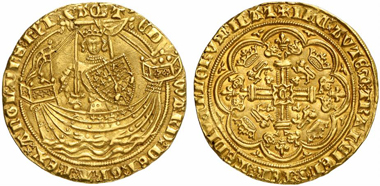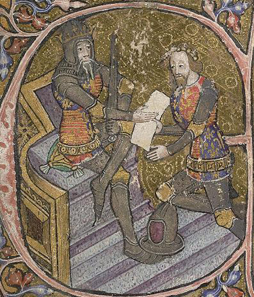by Björn Schöpe
courtesy of Barbara Balz / World Money Fair
A political statement could not be clearer. Edward III in armour, standing on a galleon, holds out his shield with the coat of arms towards the beholder: English lions and French fleur-de-lis. The ship and the reverse of the gold coin are also strewn with these significant symbols.
Edward III (1327-1377). Noble, Calais, no year. (1361/69). Mint mark cross. Seaby 1504. From Künker auction 191 (2011), 5169.
In the 1340s, Edward introduced the noble, the first English gold coin to become widely used. This fact was much appreciated by the king. After all, he wanted everybody to know that he was not only King of England, but also laid claim to the French throne, which was why he was at war with the neighbouring country.
The King of France blamed Edward, who held Gascony as a fief, of having neglected his duty as a vassal towards him, the feudal lord. When French troops occupied the English possession in 1337, England started the war. In 1340, the English monarch declared himself King of France – a confident appearance that remained without consequences. Only in 1346, Edward showed what he was capable of. He launched a major offensive, invading northern France with 15,000 soldiers. He won one battle after another, in part, thanks to the dreaded longbow archers.
14th century manuscript initial depicting Edward III of England (seated) and his son the Black Prince (kneeling). Source: Wikipedia.
In 1360, mainly because of further successful campaigns led by Edward’s eldest son, the Black Prince, France had to give in: Edward received other possessions instead of Gascony, in exchange he renounced on the throne of France. It seemed as if the king wanted to cut off his roots completely. After 200 years, French was banned from English administration and English became the official language within the realm. After Edward, no other English king would speak French as mother tongue.
However, times were difficult, even without war. The Black Death hit England, leaving the country weakened. The cost of war had been immense. England slipped into a recession during which even the nobles were debased. The king had his back to the wall. To raise taxes, he needed the approval of the parliament. In 1376, Good Parliament convened: The Lords complained about inefficiency and favouritism, initiated reforms of the government and called for annual elections. Edward had already retired from politics the year before and accepted everything. After his death in the following year, Parliament was immediately dissolved.
The Hundred Years War dragged on until 1453, with interruptions. Then, the fighting ended, but there was no peace treaty. In official documents, the English kings continued to call themselves also Kings of France until 1815. It was only in 1820 that they definitely abandoned this wishful thinking which appeared quite absurd by then.
This article was written for the catalogue of the World Money Fair 2012 whose Guest of Honour is going to be Great Britain. More on the World Money Fair 2012 you can read here.







